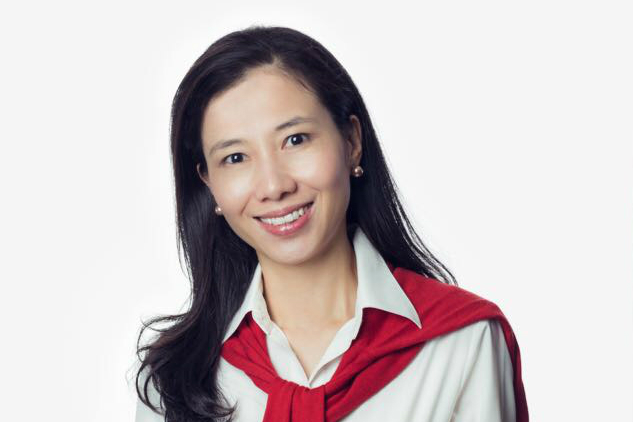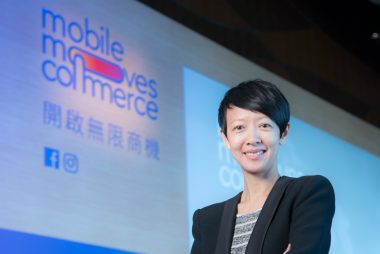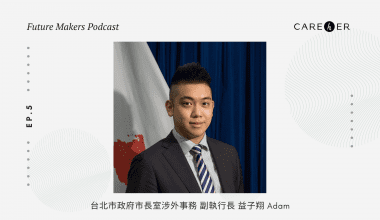各位 CAREhER 的讀者大家好,我是 Tiffany。今天我們邀請到 Alison Chan (陳芷茵),她是香港 New Frontier 的常務董事,在加入 New Frontier 之前,她曾在美國知名的顧問及專家諮詢公司-格理集團,她是中國的負責人以及新市場的開發,更之前在金融機構 JPMorgan Chase 擔任企業融資, Alison 有超過 15 年在顧問業、企業融資的經驗,現在更是香港 Harvard 商學院的會長,今天我們要來和聊聊她的職涯哲學分享。
編按:以下為英文逐字稿,有興趣的讀者可參考中文摘要稿。
Tiffany: Hi Alison.
Alison: Hi Tiffany.
It took me almost a minute to finish going through your entire resume. You have had such an amazing and outstanding career path in consulting and finance, can you take us through your jobs, let us know what the transitions were like from analyst to consultant and then into a business development role?
I conducted my undergrad studies at The University of Hong Kong —majoring in accounting & finance and leading to my degree in Business Administration. After I graduated, I joined General Electric (GE) as an internal consultant. GE runs an undergrad programme that, by then, was already ranked as one of the best in the world. I joined an extremely systematic two-year programme focusing on all areas of finance and eventually emerged to join their internal consulting team. At that time we focused on acquisition projects, executive investigations and new acquisitions.
I was in that role for a further two years, before I went back to business school, and spent two years at Harvard. Upon graduation, I had my first career change, where I leveraged my finance background and joined JPMorgan Chase in NY working in the corporate finance team for a high-yield origination. This was to be my first career transition in which I leveraged my finance background and knowledge from GE. When I was in GE, I always thought that it would be quite exciting to work for an investment bank, so that’s why after I graduated I wanted to try that—and did so for around two years. After that I went back to Asia, I founded my own company to help some Small/Medium Enterprises in fundraising and also conducted financial advisory work.
Seven years ago, I was recruited by GLG. I was initially hired as the Chief Rep. for China, and lead a new segment—building it out in Asia—starting from strategy and later focusing on execution. At the end of the day, when you try to start a new segment, business development is very important—understanding what the market wants and eventually bringing in the money—this is what you need to do. The reason for that switch, to be frank, was not planned, but simply opportunistic.
When I’m in any specific role, I am always very focused and try my best to make it work. Having said that, I’m also mindful of some of the key skill sets that I lack. I will also see something and say, “That may be interesting.” This involves a certain level of risk appetite because when you venture into something different, especially when you haven’t done it before, for example—I hadn’t done business development before, so it became interesting to me. Because of my finance background, I would say I’m more of an introvert. I would also say I used to be rather thin-skinned, but despite this I work on projects well and I find my own style that can make it work.
Alison, I want to go back to your career path, what is the main reason that triggered you to make all these job transitions, because it seems like you always venture into very different fields? Were they planned or unexpected?
As I mentioned to you, I’m quite conscious about some of the things I’m lacking. For example, I was doing finance and I knew that I should be doing more people-facing projects. This ‘movement’ also ties in with my own philosophy—for work I try to enjoy it every moment, and to me, the element of learning is very important. So when I feel like I start to plateau at learning something, I immediately want to find new directions to learn more—this would usually be the key driver for my moves.
Well actually you have to be very good at something to plateau at learning it.
I wouldn’t say that—maybe it’s just my perception of plateauing then.
So going back to your career path—looking at it, you seem to have used very different skill sets between your previous jobs and then ones you have conducted more recently that focused a lot more on business development skills. Since you didn’t have that type of experience in the beginning, how did you cultivate those skills in business development later on?
I think some people are naturally good at it—they are connectors. When I first started, I was quite sceptical because, as you know, by Chinese standards I’m quite thin-skinned. The idea of selling to others was quite horrible to me at first, which means you have to face rejection consistently. As it evolved, I gradually found my path to consultative selling. Basically, I see myself as a problem solver and provide total solutions. In addition, I also try to appreciate every client-contact moment I have. I’m supposed to cold call someone and they may have a coffee meeting with you. I would try to enjoy that moment with them, hear what their issues were and try to provide appropriate solutions. I have couple of such clients, including a few partners from consulting firms, whom later became good friends. Some of them never used any of my services until five or six years later down the road when they thought of a big project and contacted me about it. Even with no business at the beginning, I still kept in touch with them because I basically enjoy meeting new friends and understanding what they do. Sometimes they are looking for some information, or they happen to visit certain places I have been before, I’ll search for and send relevant articles to them saying, “Hey, I thought this article would be interesting to you.” This is one of the ways to cultivate relationships.
Like you said, you are an introvert. As an introvert, how do you cope with or manage negative feedback, or even rejection, from your clients?
I think there are two things, one is expectation management, and the other is the way you see yourself. Expectation management means understanding that for business development or sales, it is a probability game. You cold call by sending out 100 emails, and you probably will be able to hear back from five or six of them. It is a lot of hard work, but if you know that will likely be the range, then you will be more comfortable. Rather than taking the other 93 as rejections, you can celebrate the 7 successful cases—someone actually replied and said that they could meet up.
Secondly, as you get the chance to meet clients, first of all you have to know your product very well. Then you listen, sometimes the issues they are facing may not be directly related to your offerings, but you can still just sit there and listen actively. They will value this. The way you carry yourself is to listen actively and sincerely to what their problems are. At the end they may tell you, “You know it sounds good, but we don’t have that type of budget.”
You may find ways to work around it, but sometimes it just cannot work. It’s best if you have the balance of mind that from the moment you walk in. You listen, you propose a solution and always keep a sense of being equal. Use the same mindset as for meeting a new friend, then the sense of rejection would be lower. In Sales 101, you have to make your customer honestly tell you the true reasons why they don’t want to buy, then already, you are halfway to the final success because a lot of time there are solutions. The common problem is that many times people don’t tell you the real reasons. They just tell you something different so you need to keep drilling through the process to try and unveil the real reasons. But sometimes if it really doesn’t work, if you have the mentality of being equal, then you will be fine.
So you’re being a good listener that their feedback will also help you to perfect the product or even just to make a new friend at the end.
Yeah, absolutely.
Alison you’re a very different kind of female executive—you are very soft-spoken, considerate, carrying and very chilled, very down to earth. What is the one thing that really changed you in your career?
I think I’m very lucky, along the way I met many great female leaders. When I was younger, I was always over prepared, I read up everything and always feel quite worried. Because as a female manager, if I didn’t know more than my male colleagues, I would be afraid that others would view me as incapable. My mentor once gave me a very good advice: one has to really understand yourself and gradually groom a high level of confidence. The level of confidence means not only on topics you know well, but also that you know your own positioning, the value you can bring to the company and why you are hired to sit in the boardroom. This is unique to each individual and one has to think through it carefully.
In the past, during meetings, I was always rushing and focusing on what I had prepared, trying to show people that I was knowledgeable on the topics. Having that confidence actually allows me to acknowledge things that I don’t know, or things that I need to learn, and just ask sensible questions. It will be a much more engaging conversation, because you are actively listening and you react with the flow. This is a big difference for me. It also means that I don’t appear as tense or overly-eager as I used to. Basically, in having that confidence, you can listen and react appropriately to others and better focus on the discussion while coming across as more relaxed. This advice from my mentor really helped me a lot.
I want to talk a little bit about mentoring, since you volunteer as a mentor on the TWF Mentoring Programme, and you are also currently the President of the Harvard Business School Association in Hong Kong. Can you tell us what the common problems you see among women with their careers and how you empower them?
Confidence would be the first one. Many young women in Hong Kong are very hardworking and determined, but sometimes what they are lacking is the confidence from within. Which is quite different from males, right? For example, in early days, if I was asked to get on the stage to introduce myself, I would probably write up the script, do my research and practise for 2,000 times. But for men, many of them will probably just walk up and wing it—and very likely he will be pretty satisfied with his performance.
Yes, and they are proud of it, they would boast, “I just winged it and I didn’t prepare at all!”
But when you come across examples like this, sometimes people would say, “He appears much more confident.” So the whole executive presence goes back to how much confidence that you have. The confidence thing ties back to how well you know yourself. I think that is one key point because that also affects when are you going to raise your hand and say, “Okay, I will take this. I know that I will do a good job.” You seldom hear this from women. For guys, even for someone who’s getting the 50% of the work done, they overestimate themselves, and females always underestimate ourselves. We won’t raise up our hands until it’s 120% sure that we are doing a good job, and sometimes we are still wait for someone to call your name because we think it is too aggressive to say, “I want to help with this one.”
Can you share with us some of the organisations that you have been working with and what kind of initiatives and things that you are interested in helping out with?
Of course it’s not totally gender specific, I am lucky to have had the opportunity to work with a great diversity of people, such as the Harvard School Business Association. I think what I would like to do is to introduce our members to the 30 Percent Club, which is another global organisation aimed at promoting boardroom presence of female. ‘30 percent’ is an estimate, but basically the idea is that whoever is female and who’s capable of getting into the ballroom that they won’t be disadvantaged or not getting such jobs simply because of their gender. So, I think it’s a very good organisation—and those who are interested can check it out more. One of the things about being a mentor for a lot of the young ladies at the Women Foundation is to emphasise executive presence and about knowing yourself and being confident. This ties back to a little bit to personal branding including who you are and how you would like to be known of. And this one I have to emphasise—I think that personal branding needs to be closely tied to your personality. So, you must understand yourself well, know how to convey the message about who you are and have that confidence to say it. I think that this is very important for any female who wants to advance their career.
Right, to be authentic. So the last question we would like to ask you is about your role at New Frontier. What are some interesting things that New Frontier is doing and what is your role there?
New Frontier is a venture builder, unlike a venture capital—that just invest in companies and sit on the board, a venture builder basically builds and produces companies. So while that is based on our past experiences, we also try to systematically come up with a new playbook in terms of the setup of processes and execution roadmap—from research, to programming, to going to market, to marketing, to PR. In each area, explaining how it can be done systematically and we use this playbook to produce a company. One of the companies, our latest baby, is called Hello Toby, which is a marketplace for service providers. Right now, we are launching it in Hong Kong and it is a platform for service where users can go and find service providers for over 300+ different types of services. This service should also be launched in Taiwan soon. Users don’t need to pay for anything, they just answer couple of short questions, specific to the services that they want, and then within minutes, they will get four quotations from different providers. Consumers can then select which service providers they would like to engage.
Interesting. Thank you so much Alison for sharing your career path with us and we also look forward to a lot of new adventures that New Frontier will bring including the launch of Hello Toby in Taiwan.
管理你的期待值,把和客戶的每次接觸都看成機會 – New Frontier 常務董事 Alison Chan
Alison Chan,她是香港 New Frontier 的常務董事,這之前,她是美國知名的顧問諮詢公司-格理集團,在中國的負責人以及新市場的開發,Alison 有超過 15 年在顧問業、企業融資的經驗。
談吐之間給人輕鬆、平和感覺的 Alison,分享在跨領域的職涯轉折背後,她是如何去思考與決定自己的方向?以及身為內向者的她,如何培養自己在做業務開發上的心態:
「我發現銷售的本質底下它是一種諮詢。我把自己視為一個解決問題的人,而我總是很珍惜每一個接觸人的機會。最重要的就是你心態要平衡…」








